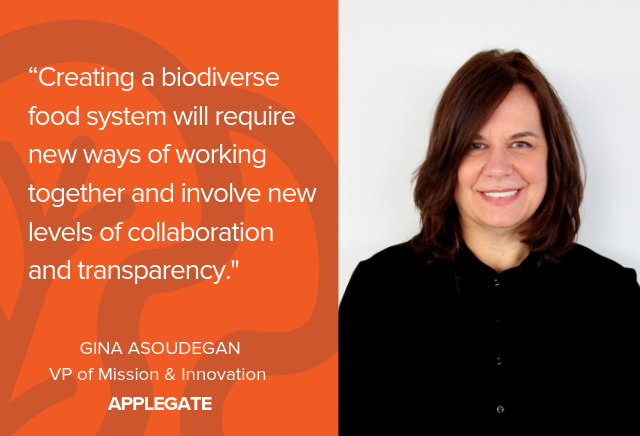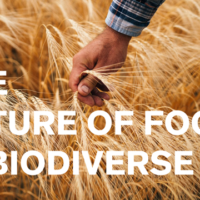
From January 7 – February 8, Food+Tech Connect and The Future Market are hosting Biodiversity: The Intersection of Taste & Sustainability, an editorial series featuring interviews with over 45 leading food industry CEOs, executives, farmers, investors and researchers on the role of biodiversity in the food industry. See the full list of participants and read about why biodiversity in food is important here.
Applegate was founded with a mission to “Change The Meat We Eat.” Now, its launching a regenerative agriculture platform where all its products will come from animals raised on pasture. Through this platform, the company hopes to build soil health, improve water quality and and increase biodiversity. It will use the Savory Institute’s Ecological Outcome Verification (EOV) program to measure its efforts and will also work with Savory to support and train producers in regenerative agriculture practices.
Below, I speak with Gina Asoudegan, vice president of mission and innovation, about how Applegate is building a collaborative regenerative agriculture platform and how they will get their customers to care.
________________________
Danielle Gould: Is biodiversity a priority for Applegate? If so, how and why?
Gina Asoudegan: Applegate’s mission is Changing The Meat We Eat, which means we’re always in pursuit of better ways to produce meat. We view regenerative agriculture as one way to do that because of its focus on building soil, improving water quality and increasing biodiversity and how animals can – if raised right – play a vital role in that process.
DG: How does Applegate define and think about biodiversity? What does an ideal biodiverse food system look like? How do you measure biodiversity, and when will we know when we’ve arrived at a “good” level of biodiversity?
GA: At Applegate, we’re thinking about biodiversity within the context of regenerative agriculture, which is a holistic, systems approach to farming. It’s based on the idea that biodiversity in the food system involves not only plants and animals, but also the other ecosystems that support them, from the microbes in the soil to the people who ultimately eat the food produced from the system.
Applegate is launching a new regenerative agriculture platform where all the products come from animals raised on pasture using farming practices that measurably improve soil health, water quality and biodiversity.
To measure biodiversity on the farms, we’ll be using the Ecological Outcome Verification (EOV) program developed by the Savory Institute. The EOV is the scientific methodology that measures and trends ecological outcomes on the land. EOV assesses key indicators of the health of the ecosystem — criteria such as soil health, biodiversity water cycle, mineral cycle, energy flow and community dynamics.
I don’t think anyone really knows what an ideal level of biodiversity looks like. The idea is to make continuous improvements, always striving for more diversity, which is the foundation of a healthy and resilient food system.
DG: What is the business case for products that promote a more biodiverse food system?
GA: Right now, there isn’t a business case for products that promote biodiversity. Mission driven companies, like Applegate, are moving in this direction because we believe it’s the right thing to do. We see regenerative agriculture and biodiversity as the next evolution in food and farming, and we intend to educate people about these ideas and drive demand for products produced this way.
The message is that sustainability is not enough. After decades of extractive practices like monocultures that degrade soil, we need to do more than just sustain. We need to build and regenerate by using farming practices that promote soil health and biodiversity.
DG: What investments need to be made to create a more biodiverse food system?
GA: The most important investment that needs to be made is support and training for producers. At Applegate we plan to work with the Savory Institute to train producers on regenerative agriculture practices.
DG: What are the greatest challenges and opportunities your organization faces for creating a more biodiverse system? What are you doing to overcome or capture them?
GA: Resistance to change, and the other side of the same coin – fear of the unknown – are always the challenges one faces as an early adopter of new ideas. The best way to get farmers onboard with an idea like regenerative agriculture is to demonstrate how it benefits them. One of the reasons Applegate is using the Savory Institute’s Ecological Outcome Verification (EOV) program is that it allows us to prove to farmers that their regenerative practices are building soil, improving water quality and increasing biodiversity, all of which make their farms more resilient, productive and profitable.
DG: How are you or how do you plan to handle the sourcing and scaling of biodiverse ingredients?
GA: Collaboration is key to scaling pastured, regenerative livestock systems. For Applegate, that means working with retailers to commit to taking the product and finding outlets and/or partners to help utilize all the parts of the animal that we can’t use. Working this way helps mitigate risk for everyone in the supply web.
DG: Does your average customer care about biodiversity today? Why should they care? How do you (or will you) get them to care?
GA: The average consumer today is not aware that their food comes from monocultures or that the world is in the midst of a soil crisis, nor are those the messages that will change their purchasing behavior. But at Applegate, we’ve faced a similar challenge: educating consumers about the dangers of antibiotic resistance due to the abuse of antibiotics in animal agriculture.
What we learned: any talk about a food crisis has to be balanced with a message of hope. Hope stems from the confidence that we know how to SOLVE for these complex issues and our customers can participate in the solution through their purchasing decisions.
We see regenerative agriculture as a viable solution for building soil and biodiversity and we plan to educate our customers about the benefits of this kind of farming. We also plan to share with them the metrics of the Ecological Outcome Verification (EOV) program as proof of our efforts.
DG: What are some of the most important things retailers, food manufacturers and other key parts of the food supply chain can do to support biodiversity?
GA: The most important thing retailers, food manufacturers and other key parts of the food supply chain can do to support biodiversity is to be truly committed to it. Creating a biodiverse food system will require new ways of working together and involve new levels of collaboration and transparency. Ironically, supply chains will need to function more like a healthy, biodiverse ecosystem! In fact, people in the regenerative agriculture community have stopped using the term “supply chain” in favor of “supply web,” which better describes the interconnected, collaborative and resilient networks needed to create a biodiverse food system.
DG: How would a more biodiverse food system change the typical selection of products we see in a grocery store?
GA: As we achieve a more biodiverse food system, food in the grocery store will be sold and merchandized in a way that reflects the holistic ecosystem that produced it. Meat might be merchandized as the whole animal with primal cuts like steaks and chops alongside bacon, sausage, hams, bone broth, offal, pork rinds, guanciale, etc…. Terroir will also become important as meat will have regional and seasonal flavor nuances depending on what part of the country the animal was raised and what the animal ate throughout the year. As a result, we might see products like summer sausage and winter sausage where meat is blended with the herbs, fruits and nuts raised alongside the animals each season.
DG: Are there certain products you would like to see more of in the food industry — either in foodservice or CPG — that would help promote a more biodiverse agricultural system?
GA: I’d like to see more products in the food industry that are focused on flavor and the kind of nutrition you only get from food that comes from a biodiverse system with healthy soil that’s teeming with life. J.I Rodale said it best: Healthy Soil = Healthy Food = Healthy People.
DG: What is your vision for what a more biodiverse food system looks like in 10-15 years?
GA: I imagine we’re going to see the development of regionalized supply webs where food is raised, processed and shipped in closer proximity to the end customer. I also see a shift toward regenerative agriculture practices and toward growing food based on flavor, culinary quality and nutrition density, as opposed to its ability to withstand being shipped or stored for long periods of time. These kinds of food system shifts will have the added benefit of attracting a new generation of young farmers who are already interested in farming this way.
Read all of the interviews here and learn more about Biodiversity at The Future Market.
_____________________
 Gina Asoudegan, Vice President of Mission and Innovation at Applegate
Gina Asoudegan, Vice President of Mission and Innovation at Applegate
Gina Asoudegan is Vice President of Mission and Innovation at Applegate where she develops the strategy for the company’s regenerative agriculture platform, creating products from meat raised on pasture using regenerative farming practices and building the supply chains to support them.
Gina started her career in food more than 25 years ago as a restauranteur, caterer and event planner in Philadelphia where she was an early adopter of the Farm-to-Table movement.
During her tenure at Applegate, Gina has worked closely with NGOs to raise awareness about the misuse of antibiotics in animals raised for food and its link to resistance in humans. She led the production and marketing of the documentary film, RESISTANCE, garnering global distribution for the film.
Gina is on the advisory boards of the Savory Institute, the Regenerative Supply Working Group, the Sustainable Food Lab and The National Young Farmers Coalition. She is also a member of the Esca Bona Innovation Cohort– A thought leadership group working on solutions to expand sustainable food supply chains.





